 A few weeks ago Paul Rogers of the Mercury News wrote that despite the general perception that the current administration having accomplished relatively little Obama has in fact made major strides in national environmental policy. Some examples not included in the article are: the significant tightening of the previously weak regulations surrounding non-conventionally raised livestock, and the FTC’s stepping up efforts to address greenwashing amidst increasing complaints
A few weeks ago Paul Rogers of the Mercury News wrote that despite the general perception that the current administration having accomplished relatively little Obama has in fact made major strides in national environmental policy. Some examples not included in the article are: the significant tightening of the previously weak regulations surrounding non-conventionally raised livestock, and the FTC’s stepping up efforts to address greenwashing amidst increasing complaints
and problems such as the bogus “bamboo” textiles.
Category Archives: Food & Cooking
Ocean overview
http://www.flickr.com/photos/worldworldworld/3314227532/ Not only is the infamous Pacific Garbage Patch (or gyre as it is properly known) possibly much larger than previously estimated, an Atlantic counterpart has been discovered.
In more local news, your orders of fried clams this summer might get a little expensive. Researchers have warned that New England may experience major red tide events this year.
Lastly, a potentially positive piece: California is considering “un-grand-fathering” power plants permits to dump waste heat into coastal waters.
Remember the rainforest?
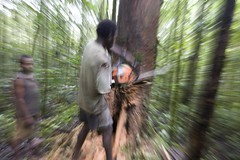 The poster child of human environmental destruction in the 90’s is still imperiled, even if the focus has shifted to global warming. Of course the two are intimately related, and besides the forests’ huge impacts on local watersheds—effectively creating their own rain—the forests’ trees and soils obviously have a major impact on the carbon cycle. Still, the onslaught upon the lungs of the world is not only unrelenting but expanding. Continue reading
The poster child of human environmental destruction in the 90’s is still imperiled, even if the focus has shifted to global warming. Of course the two are intimately related, and besides the forests’ huge impacts on local watersheds—effectively creating their own rain—the forests’ trees and soils obviously have a major impact on the carbon cycle. Still, the onslaught upon the lungs of the world is not only unrelenting but expanding. Continue reading
Green (and free!) events hosted by Somerville Climate Action
Looking for a green activity to keep the February doldrums at bay? Check out these free events hosted by Somerville Climate Action on February 22nd!
Got water, ambient light, 2 minutes per day & a spare glass jar? We’ll supply the seeds! Learn the essentials of year-round countertop sprouting & take home your own starter kit.
BRING A WIDE MOUTH GLASS JAR (one pint (16 oz.) to one quart (32 oz.) size range – Mason jars work great.
Monday February 22 @ 6-6:30 pm Somerville Public Library @ 79 Highland Ave
_________________________
State Representative Denise Provost TRANSITION SOMERVILLE and Somerville Climate Action Present:
FOOD, INC.
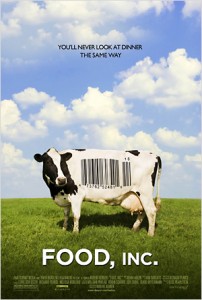
Followed by a discussion Monday February 22 at 6:30 pm
Somerville Public Library at 79 Highland Avenue
Environmental pawprints
Lest our dog-owning readers think that the above comic unfairly singles out their pooches, note that the original research it is commenting upon is not limited to canines. It turns out that a variety of pets have numerous, oft-overlooked consequences for the environment, be it illegal bird and fish trafficking, or the insistence that Fluffy should eat better than her owner. The latter is a rather disturbing and unnatural trend since undomesticated Felis and Canis eat as much of their prey as they can, offal and all. Indeed, one of the major impacts of free ranging cats is songbird predation.
Water pollution is another unfortunate side-effect of pets. Pooper-scooper laws are not just about aesthetics and clean shoes, but public and environmental health. Besides carrying a variety of pathogens, Spot’s spots are essentially fertilizer and can contribute to algal blooms and fish kills if they make it into water ways. It is especially important to clean up after your dog—and there are free baggie dispensers in case you forget to grab some on your way out—if you bring him to Fresh Pond, since this beautiful water body is an important wildlife habitat and a part of our water supply. Cat waste can also contribute to water pollution. Flushable litter has lead to the decline of Californian sea otters, and it can infect other wildlife as well e.g; filter-feeders such as oysters and clams. Other choices of litter are also problematic, although a variety of less harmful options are available.
None of this is to say that you should not have a pet, or dissuade you from pets in the future, but merely to add to the list of things you should consider before doing so besides whether or not you have the necessary time to devote to the pet’s care and convincing your landlord/partner to allow it.
- Adopt rather than buy, and if you’re leaning towards exotics be sure to purchase from a reputable dealer.
- Always spay or neuter.
- Keep Fluffy indoors, and clean up after Spot.
- Although Fluffy (arguably) cannot survive on bread alone, neither she nor Spot needs filet mingon or Patagonia toothfish
- If you keep fish, be careful with your aquarium plants to avoid contributing to the spread of invasive species such as Caulerpa taxifolia
Tobacco powered trucks?
 On their face, biofuels seem like a pretty good idea: carbon dioxide and sunlight in, carbon dioxide and energy out. Certainly some hobbyists manage to recover waste grease for use in diesel engines, but commercially the field has been dominated by the fermentation of sugars from food crops into ethanol. Unfortunately, due to the large petro-chemical inputs often employed it is unclear whether the result is a net gain. In addition, much attention has been given to the competing interests of fuel vs. food (vs. land conservation).
On their face, biofuels seem like a pretty good idea: carbon dioxide and sunlight in, carbon dioxide and energy out. Certainly some hobbyists manage to recover waste grease for use in diesel engines, but commercially the field has been dominated by the fermentation of sugars from food crops into ethanol. Unfortunately, due to the large petro-chemical inputs often employed it is unclear whether the result is a net gain. In addition, much attention has been given to the competing interests of fuel vs. food (vs. land conservation).
There is hope that research into the production of cellulosic ethanol, or alcohol from plant fibers, could soon tip the balance decidedly in favor of biofuels. One could use agricultural waste or fast-growing special cover crops however, this material should arguably be composted back into the fields… But what if you could make use of existing knowledge and agricultural land; instead of converting forest into sugarcane fields, or farming prairie? Perhaps even provide a competing market for an otherwise dubious product? This may be possible if research into genetically modified tobacco proves to be fruitful. These plants do not contain pesticide-producing or herbicide-resistance genes. Instead, scientists are working on ways to make the leaves of the plant express existing genes and produce more oil for use in fuel production.
Sustainable (sea)food
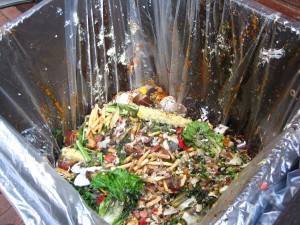
New Scientist has an interesting article on the “Five eco-crimes we commit everyday.” Most are not very surprising, but the details are interesting, such as the fact that the western world wastes one third of its food!
Egregious as this waste is, the means used to produce and procure much of our food is more important. To this end, Slash Food has a brief post highlighting some better seafood choices including local award-winning business Aqua Australis.
Also released this past week, a study of food sustainability revealing that, surprise of surprises, the devil is in the details and “food miles” are an over-simplification.
Green Holiday Guides
One of the coolest things about Thanksgiving? Unlike Halloween, it’s not about stuff. While Halloween wouldn’t be the same without candy, costumes, and décor, Thanksgiving celebrates giving thanks for what you already have. What a relief for your pocketbook and the planet. —treehugger
Free tickets for the Museum of Science
 CEA has received a number of tickets for free general admission to the Museum of Science, and is making them available to interested parties. They will be available for pick-up from CEA’s offices beginning at noon on Friday 9/25, which should be staffed until 7PM on that date. Note: The tickets expire Wednesday 9/30.
CEA has received a number of tickets for free general admission to the Museum of Science, and is making them available to interested parties. They will be available for pick-up from CEA’s offices beginning at noon on Friday 9/25, which should be staffed until 7PM on that date. Note: The tickets expire Wednesday 9/30.
Alas, this windfall comes a little late for you to catch Manufactured landscapes, and too early for Running the Numbers: Portraits of Mass Consumption. However, the museum has a number of other interesting exhibits—including several related to energy—as well as a special showing of the new film Food, Inc. on Wednesday at 2; advanced registration required.
The tickets were donated by The WhizKids Foundation, a Cambridge-based non-profit that works with local schools to improve STEM education.
Local Restaurants Go Green
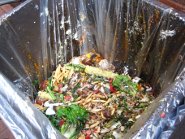
Digging Deep To Find Green Restaurants
With all the hype these days about “local”, “green” and “sustainable,” its often difficult for consumers to weed out the green-washing and dig deeper to find the real good guys. Often, simply changing out light bulbs (while an excellent effort) isn’t enough. Some companies are taking it the extra mile and finding creative ways to improve their sustainability on a holistic level—effecting not only their own business environment but also the practices of the vendors they work with.
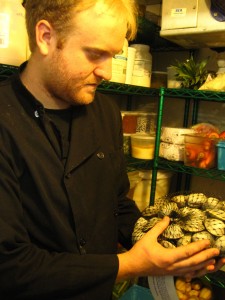
Sous Chef John Gilman shows off Welfleet Littlenecks
Cambridge Brewing Company, a small in-house brewery, pub and restaurant in Kendall Square, is one of those companies. To further integrate sustainability into their business operations, Cambridge Brewing Company is working with the Sustainable Business Leader Program, a non-profit consulting service that works with local businesses to help green their operations. Through their work with SBLP, Cambridge Brewing Company has increased their composting efforts and is in the process of reducing their water consumption. They also make an effort to source much of their food locally, and now chef David Drew is taking it to the next level. Rather than asking his suppliers for specific foods he wants, he asks them what they have too much of. Recently Drew’s sous chef turned him on to Acadian Redfish. Says Drew, “These fish are a bycatch of a lot of the local haddock boats, meaning that both the haddock and redfish were going after the same bait and coming up in the nets. We learned that a lot of this redfish wasn’t being put to good use. Through our seafood purveyor we were able to get these redfish cleaned up for us. We put them on our menu for the summer in a fish taco dish and they were a huge success. One of our biggest sellers!”
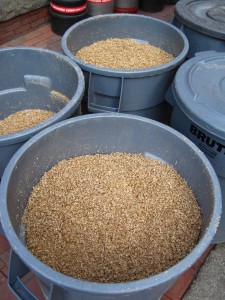
Cambridge Brewing Company also composts all of their spent grain and food waste
By purchasing a food source that was abundantly available yet not in demand, Cambridge Brewing Company acted not only in the interests of their customers, but also their vendors. They forged a stronger bond with their fish purveyor, and they’ve continued to pursue this method of purchasing with their other vendors, helping to promote a sustainable local food market. Says Drew, “The people we use now are in this business because it’s what they love to do. They have personalities and histories and stories and when you call to place an order, you get to talk to a real person! These are community people who happen to be in the business of providing food for us. It takes a little extra effort to go out and find the local guys…the farmers, fishermen, honey guy, pickle guy, etc. But it’s so worth it.”
The number of farms in Massachusetts increased by 27 percent with 1,616 more farms since 2002, and farmland has finally stabilized with only 1/7 of 1 percent of farmland acres lost, according to the 2007 Census of Agriculture. While consumers can help their local farms by buying from farmers markets, they can also show their commitment to a sustainable food economy by supporting restaurants that source as locally (and sustainably) as possible. And as the demand for this quality of food grows, so will those farms.
